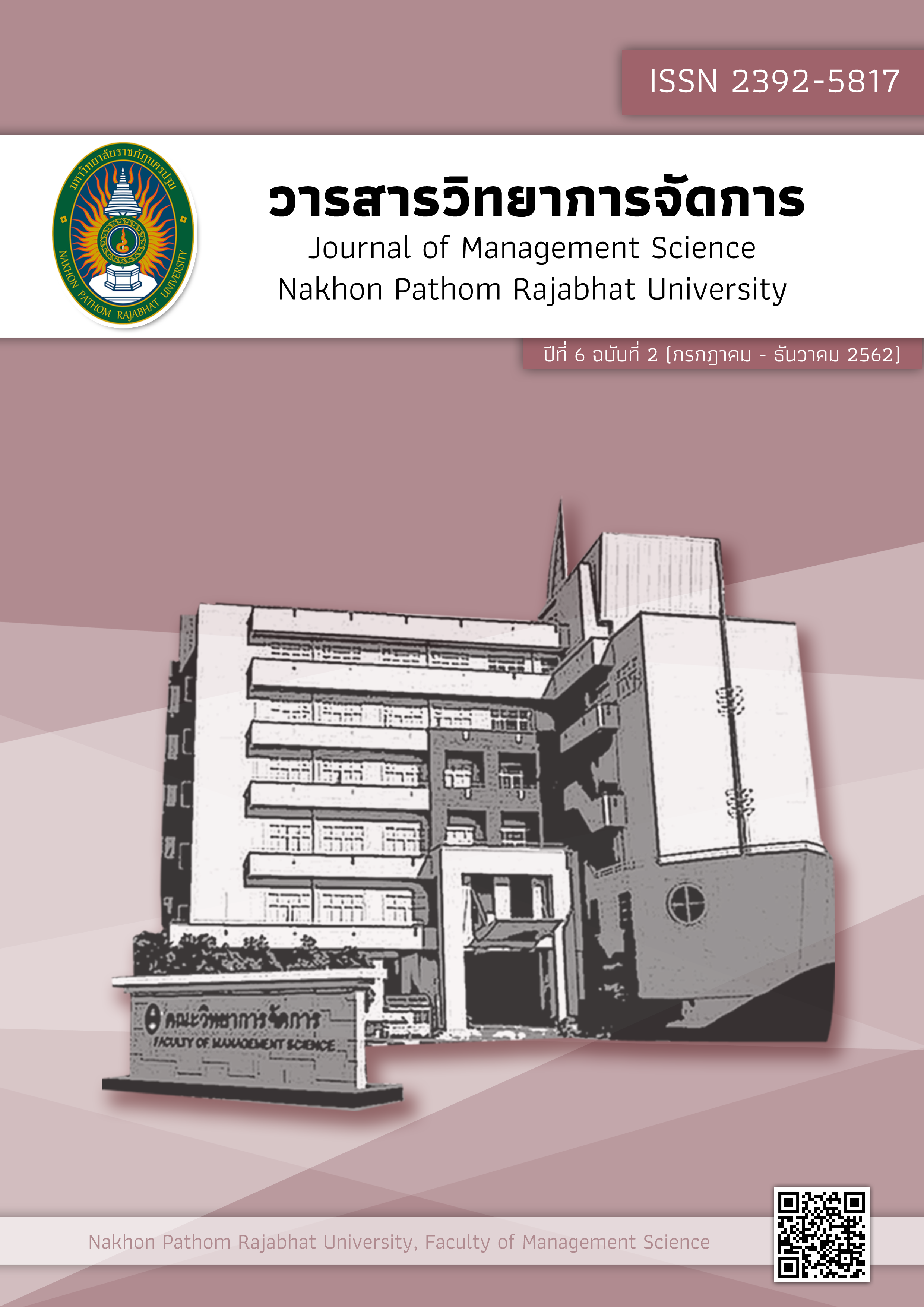Employee Needs according to ERG theory and Interpersonal Relationship in Organization Affecting Organizational Conflict in Electronic Industry That affects conflicts in organizations in the electronics industry
Main Article Content
Abstract
The objectives of this research were to study 1) the employee’s motivation level according to the ERG theory, interpersonal relationship according to Sangahavatthu-4 and organizational conflict; and 2) influence of employee’s motivation according to ERG theory and interpersonal relationship according to Sangahavatthu-4 on the employee’s organizational conflicts in electronics industry. Studied population was employees working in electronics industry located in Bangkok and metropolitan area and there were 514 employees being selected as studied samples. The data collection used the questionnaire. Data analysis employed frequency, percentage, mean, standard deviation, and multiple regression analysis.
The results of the study showed that employee needs in terms of employee’s relationship affected organizational conflicts in relation to relationship with colleagues and opposite direction process. In the meantime, interpersonal relationship according to Sangahavatthu-4 in terms of convincing speech and equitable treatment affected organizational conflicts in relation to work and opposite direction process. Additionally, interpersonal relationship according to Sangahavatthu-4 in terms of voluntary affected organizational conflicts in relation to work and relationship with colleagues in the same direction at the statistically significant level as of 0.05.
Article history : Received 22 February 2019
Revised 1 April 2019
Accepted 2 April 2019
SIMILARITY INDEX = 0.00
Article Details
The views and opinions of the article appearing in this journal are those of the author. It is not considered a view and responsibility of the editorial staff.
References
กฤษดา เชียรวัฒนสุข. (2556). หลักการจัดการและองค์การ. กรุงเทพฯ: ทริปเพิ้ล กรุ๊ป
กฤษดา เชียรวัฒนสุข. (2553). ผลกระทบของกระบวนแบบการจัดการความขัดแย้งของ พนักงานที่มีต่อความขัดแย้งด้านงาน ความขัดแย้งด้านความสัมพันธ์และความเครียดในภาคอุตสาหกรรมโทรคมนาคมของไทย. วารสารพฤติกรรมศาสตร์,16(2), 13–31.
กอแก้ว จันทร์กิ่งทอง. (2557). ความสัมพันธ์ระหว่างพฤติกรรมในองค์การต่อผลการดำเนินงาน: การทบทวนวรรณกรรม. เอกสารการประชุมหาดใหญ่วิชาการระดับชาติและนานาชาติ ครั้งที่ 5. มหาวิทยาลัยหาดใหญ่ สงขลา.
ชัยยา ทองอาบ. (2553). การใช้หลักมนุษยสัมพันธ์เชิงพุทธในสำนักงานปลัดกระทรวงแรงงาน. วิทยานิพนธ์พุทธศาสตรมหาบัณฑิต. บัณฑิตวิทยาลัย. กรุงเทพมหานคร: มหาวิทยาลัยมหาจุฬาลงกรณราชวิทยาลัย.
ชญารัศมี ทรัพยรัตน์. (2556). พฤติกรรมการเป็นสมาชิกที่ดีขององค์การกับผลลัพธ์ที่เกิดขึ้น. FEU ACADEMIC REVIEW, 7(1). 7-22.
นิรมล กลัดสมบูรณ์. (2557). ผลกระทบของการคิดแบบเหมารวมต่อความขัดแย้งภายในกลุ่มของพนักงานในภาคอุตสาหกรรมการผลิต จังหวัดนครราชสีมา. วิทยานิพนธ์. ปริญญาการจัดการมหาบัณฑิต, สาขาวิชาเทคโนโลยีการจัดการ, มหาวิทยาลัยเทคโนโลยีสุรนารี.
เนาวรัตน์ ชุง และกฤษดา เชียรวัฒนสุข. (2559). การลดความขัดแย้งในองค์การโดยใช้หลักภาวะผู้นำตามหลักสัปปุริสธรรม 7 และหลักมนุษยสัมพันธ์ตามหลักสังคหวัตถุ 4 เปรียบเทียบระหว่างพนักงานกลุ่มบริษัทเอเชียและกลุ่มบริษัทยุโรป-อเมริกาในกลุ่มอุตสาหกรรมอิเล็กทรอนิกส์ จังหวัดปทุมธานีและพระนครศรีอยุธยา. วารสารบริหารธุรกิจศรีนครินทรวิโรฒ, 7(2), 60-85.
บุญช่วง ศรีธรราษฎร์. (2560). ความสัมพันธ์ระหว่างมนุษยสัมพันธ์ที่ดีกับประสิทธิภาพการทำงานของนักบัญชีธุรกิจอุตสาหกรรมในเขตจังหวัดร้อยเอ็ด. วารสารวิทยาการจัดการมหาวิทยาลัยราชภัฏเชียงราย, 11(2), 29-48.
พระมหานภดล สีทอง. (2554). ความสัมพันธ์ระหว่างคุณธรรมด้านสังคหวัตถุ 4 และขันติ-โสรัจจะกับพฤติกรรมการเป็นสมาชิกที่ดีขององค์การของบุคลากร: ศึกษาเฉพาะกรณีบุคลากรของสำนักนโยบายและยุทธศาสตร์ สำนักงานปลัดกระทรวงสาธารณสุข. วิทยานิพนธ์ปริญญามหาบัณฑิต, มหาวิทยาลัยเทคโนโลยีพระจอมเกล้าพระนครเหนือ.
วราภรณ์ ตระกูลสฤษดิ์. (2549). จิตวิทยาการปรับตัว. กรุงเทพฯ: ศูนย์ส่งเสริมวิชาการ. ศูนย์วิจัยเศรษฐกิจ ธุรกิจ และเศรษฐกิจฐานราก ธนาคารออมสิน. (2559). อุตสาหกรรมเครื่องใช้ไฟฟ้าและอิเล็กทรอนิกส์.[ออนไลน์] ค้นเมื่อ 16 มกราคม 2560 จาก https://www.gsb.or.th/GSB-Research/เศรษฐกิจอุตสาหกรรม/ภาวะอุตสาหกรรมรายสาขา/การผลิต/เครื่องใช้ไฟฟ้าและอิเล็กทรอนิกส์.
สายงานวิชาการ สภาอุตสาหกรรมแห่งประเทศไทย. (2560). Industrial Review ภาวะอุตสาหกรรมประจำเดือนมกราคม 2560. [ออนไลน์] ค้นเมื่อ 16 มิถุนายน 2560 จาก https://www.fti.or.th/2016/download/technical/Industrial_Review_January_2560_994.pdf
อำนวย เดชชัยศรี และสุทธิพงษ์ ศรีวิชัย. (2560). ทักษะการบริหารมนุยสัมพันธ์ตามแนวพุทธ. วารสารมหาจุฬาวิชาการ, 4(1), 48-64.
อรนุช โขพิมพ์ เอกฉัท จารุเมธีชน ประยูร แสงใส และสุเทพ ปาลสาร. (2557). ภาวะผู้นำตามหลักสัปปุริสธรรม 7 ของผู้บริหารโรงเรียนพระปริยัติธรรมแผนกสามัญศึกษา จังหวัดขอนแก่น. วารสารบัณฑิตศึกษามหาจุฬาขอนแก่น, 1(2), 25-35.
อรศิริ เกตุศรีพงษ์. (2550). สังคหวัตถุ 4 : วัฒนธรรมองค์การที่เอื้อต่อการจัดการความรู้. วารสาร Productivity World เพื่อการเพิ่มผลผลิต, 12(68), 43-46.
C. K. W. De Dreu & E. Van de Vliert. (1997). Using Conflict in Organizations. London : Sage.
Chienwattanasook, K. (2010). The Impact of Gender, Conflict Management Styles, and the Ability to Handle Ambiguity on Task Conflict, Relationship Conflict, and Stress. Dissertation, Doctor of Business Administration. Chon Buri : Burapha Univesrsity.
Chung, N., & Chienwattanasook, K. (2016). Reducing Organizational Conflicts by Using Interpersonal Relationship Management According to the 4 Principles of Service (Sangahavatthu 4), A Contrast between Asian and European–American Firms. In Proceeding of International Conference in Innovative Business and Entrepreneurship 2016 (ICIBE – 2016) (pp.57-68). Pathum Thani: Rangsit University.
Gamero, N., González-Romá, V., Peiró, J. M. (2008). The influence of intra‐team conflict on work teams' affective climate: A longitudinal study. Journal of Occupational and Organizational Psychology, 8(1), 47-69.
Halevy, N., Chou, E. Y., Galinsky, A. D., Murnighan, J. K. (2012). When Hierarchy Wins: Evidence From the National Basketball Association. Social Psychological and Personality Science, 3(4), 398-406.
Karen A. Jehn, Elizabeth A. Mannix. (2001). The Dynamic Nature of Conflict : A Longitudinal Study of Intragroup Conflict and Group Performance. Academy of Management Journal, 44(2), 238-251.
Robbins, S. P., & Judge, T. A. (2013). Essentials of organizational behavior. (12th ed.). Upper Saddle River, New Jersey: Pearson Education.
Yamane, T. (1973). Statistics: An Introductory Analysis. (3rd ed.). New York: Harper and Row Publication.


